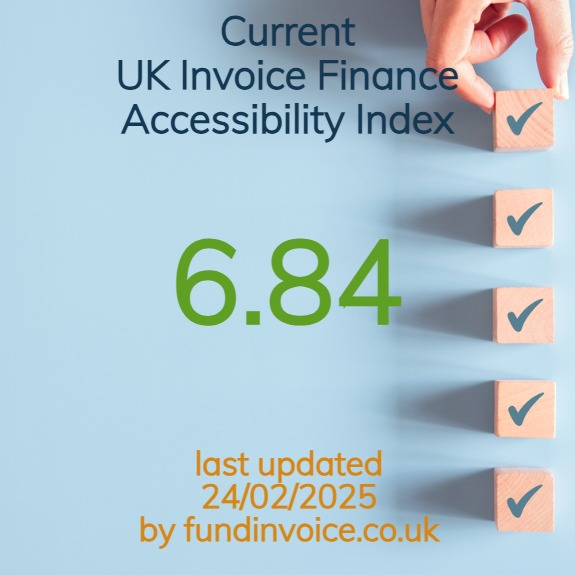- 17 May
UK Invoice Finance Accessibility Index
We have produced a UK Invoice Finance Accessibility Index to track the liberality of the UK invoice financing market and highlight & track changes over time.
The index is to help prospective customers and existing users gauge the current appetite amongst invoice finance companies to offer new or alternative facilities.
UK Invoice Finance Accessibility Index
The current Invoice Finance Accessibility Index is estimated to be:
- 6.84 (out of 10).
This suggests a sector that is quite liberal, with a high-risk appetite and a strong willingness to negotiate on rates and terms. This value is justified by high approval rates, competitive average financing rates, moderate risk premiums, significant flexibility, and positive market sentiment. This index will be updated if we feel it has changed. Historic values are shown below.
How We Estimate The Invoice Finance Accessibility Index
 To estimate the current liberality index of the UK invoice financing sector, we use recent trends, market analysis, and estimated data points based on industry knowledge. Here’s a detailed explanation of the estimation:
To estimate the current liberality index of the UK invoice financing sector, we use recent trends, market analysis, and estimated data points based on industry knowledge. Here’s a detailed explanation of the estimation:Key Indicators and Data
1) Approval Rates:
Recent industry reports suggest that approval rates have increased as invoice financing becomes a more popular alternative to traditional loans. However, the appetite for marginal deals has hardened.
Estimated Score: 6.5 (indicating a slight hardening in approval rates).2) Average Financing Rates:
Market competition has led to slightly reduced rates, making financing more attractive to businesses.
Estimated Score: 7.25 (reflecting competitive rates for the right deal with competitive deals still out there).3) Risk Premiums:
While premiums exist, they have been stable, indicating moderate risk assessment.
Estimated Score: 6.0 (showing moderate risk premiums).4) Flexibility in Terms:
Some providers have sought additional security to support marginal propositions despite a generally high appetite to do business.
Estimated Score: 7.5 (indicating high flexibility).5) Market Sentiment:
Businesses generally view invoice financing positively, appreciating the quick access to funds.
Estimated Score: 7.5 (reflecting positive market sentiment).Weighting the Indicators
- Approval Rates: 30%
- Average Financing Rates: 25%
- Risk Premiums: 20%
- Flexibility in Terms: 15%
- Market Sentiment: 10%
Scoring Each Indicator
- Approval Rates: 6.5
- Average Financing Rates: 7.25
- Risk Premiums: 6.0
- Flexibility in Terms: 7.5
- Market Sentiment: 7.5
Calculating the Index
The sum of weighted scores = 6.84
Justification for Index Value
- Approval Rates: The score reflects a slight hardening in the approval rates.
- Average Financing Rates: This suggests competitive rates, showing a willingness to attract more clients through favourable pricing.
- Risk Premiums: The score indicates that while premiums for riskier businesses exist, they are not excessive.
- Flexibility in Terms: The score highlights more flexibility in terms, making invoice financing appealing to a broader range of businesses.
- Market Sentiment: The score reflects positive feedback from businesses, underscoring the sector's good standing.
Conclusion
The current liberality index for the UK invoice financing sector suggests a sector that is quite liberal, with a high-risk appetite and a strong willingness to negotiate on rates and terms. High approval rates, competitive average financing rates, moderate risk premiums, significant flexibility, and positive market sentiment justify this value.
Historical Values
DATE INDEX JUSTIFICATION
24/02/2025 6.84 Slight hardening in approvals but competitive rates are available for the right deals. 17/09/2024 7.08 There has been an increased appetite from some providers reflected in this slight uptick in the index. 31/05/2024 6.80 This reflects a slight hardening in what some providers will consider and requests for additional security to support more marginal propositions. 15/05/2024 7.50 This suggests a sector that is quite liberal, with a high-risk appetite and a strong willingness to negotiate on rates and terms. High approval rates, competitive average financing rates, moderate risk premiums, significant flexibility, and positive market sentiment justify this value.
- Home
- Business Financing
- Invoice Finance
- Invoice Discounting
- Factoring
- Debt Factoring
- Recourse Factoring
- Fund Selected Invoices
- Business Loans
- Construction Sector Funding
- Protect Against Bad Debts
- Exports Collection And Funding
- Import Funding
- Body Shop Funding
- Spot Factoring
- Retail Sector Funding
- Fund Invoices Confidentially
- Help Running Your Payroll
- CHOCs Customer Handles Own Collections
- Collect Invoices Confidentially And Funding
- Outsourcing Your Credit Control
- Asset Finance And Mortgages
- Case Studies
- About Us
- Testimonials
- Find Out More
- News
- Free Magazine
- Blog






